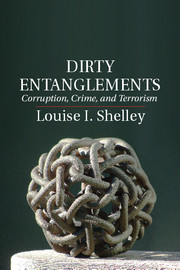Book contents
- Frontmatter
- Dedication
- Contents
- Figure, Maps, and Tables
- Acknowledgments
- Introduction
- Part I The Logic of Corruption, Crime, and Terrorism
- 1 Crime and Corruption behind the Mass Attacks
- 2 Corruption
- 3 The Evolution of Organized Crime and Terrorism
- 4 Environments, Global Networks, and Pipelines
- Part II The Diverse Businesses of Terrorism
- Index
- References
2 - Corruption
An Incubator of Organized Crime and Terrorism
Published online by Cambridge University Press: 05 August 2014
- Frontmatter
- Dedication
- Contents
- Figure, Maps, and Tables
- Acknowledgments
- Introduction
- Part I The Logic of Corruption, Crime, and Terrorism
- 1 Crime and Corruption behind the Mass Attacks
- 2 Corruption
- 3 The Evolution of Organized Crime and Terrorism
- 4 Environments, Global Networks, and Pipelines
- Part II The Diverse Businesses of Terrorism
- Index
- References
Summary
Turkey is at the crossroads between Asia and Europe. During the Ottoman period, there was a large and highly trained, but also corrupt, bureaucracy. Modern Turkey shares this attribute. Even though Turkey is one of the world’s rising economies and a member of the G-20, its governance is undermined, particularly by corruption in its border regions, but also by the massive corruption in neighboring states.
Turkey’s border area with Iran and the Caucasus is impoverished and inhabited by Turkey’s minority Kurdish community, who share kinship relations with Kurds in four neighboring Middle East countries. Familial and clan groups have been involved in trade, much of it outside the control of the state, for centuries. The regional instability and the lack of education and employment for youthful males or capital for development result in a great reliance on cross-border smuggling for contemporary survival. People, arms, antiquities, counterfeits, and cigarettes can move easily across borders with Iran, Iraq, and Syria.
Information
- Type
- Chapter
- Information
- Dirty EntanglementsCorruption, Crime, and Terrorism, pp. 64 - 96Publisher: Cambridge University PressPrint publication year: 2014
References
Accessibility standard: Unknown
Why this information is here
This section outlines the accessibility features of this content - including support for screen readers, full keyboard navigation and high-contrast display options. This may not be relevant for you.Accessibility Information
- 2
- Cited by
